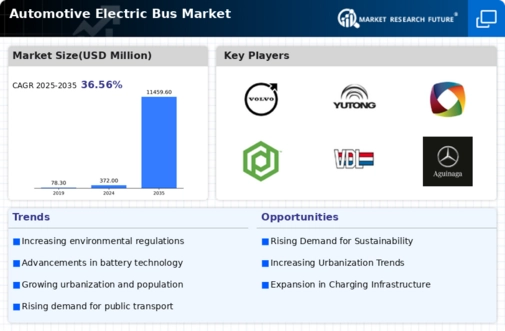Top Industry Leaders in the Automotive Electric Bus Market

*Disclaimer: List of key companies in no particular order
The Dynamic Evolution Fierce Contest in the Market for Automotive Electric Buses
In the throes of a captivating metamorphosis lies the global automotive electric bus market. Propelled by environmental apprehensions, government imperatives, and technological strides, this once embryonic sector is hurtling into the realms of mainstream acceptance. Within this dynamic panorama, a diverse array of contenders maneuvers, each vying for a strategic stance in a market teeming with possibilities. In this milieu, comprehending the competitive landscape becomes paramount, not solely for established participants but also for prospective new entrants.
Strategic Approaches of Key Players:
- MAN
- Volvo
- Yutong
- BYD
- Proterra
- VDL GROEP
- Mercedes Benz AG
- NFI Group
- EBUSCO
- Zhongtong Bus Holding
Established Bus Manufacturers: Pioneering entities like Daimler (Mercedes-Benz eCitaro) and Volvo (Volvo 7900 Electric) leverage their ingrained brand recognition, expansive service networks, and manufacturing prowess to establish a foothold. Their focus centers on premium sectors and cutting-edge battery technology.
Dominance of Chinese Champions: BYD, Yutong, and King Long reign supreme in the market, offering cost-effective solutions, implementing assertive expansion strategies, and benefiting from robust government backing. Their focus lies in extensive city bus deployments, emphasizing affordability and swift implementation.
Start-Up Dynamism: Emerging players such as Proterra (US) and Arrival (UK) inject innovation and agility into the landscape. They specialize in distinctive segments like school buses or zero-emission platforms, embracing flexible manufacturing and data-centric solutions.
Disruptive Technological Forces: Tesla's foray into the arena with the Semi truck holds the promise of long-range capabilities and innovative charging infrastructure, potentially shaking up the commercial vehicle segment. Companies like Siemens and ABB concentrate on charging infrastructure and energy management, playing a pivotal role in ecosystem evolution.
Analysis of Market Share:
Geographical Influence: Presently, the market exhibits a pronounced skew towards China, propelled by government subsidies and a vast domestic market. Nevertheless, Europe and North America are catching up, driven by stringent emission regulations and ambitious electrification objectives.
Bus Categorization: City buses claim the lion's share of the market, closely followed by intercity and school buses. Niche segments like airport shuttles and tourist coaches are also gaining prominence.
Technological Dynamics: Battery-electric buses (BEVs) stand as the prevailing technology, yet hydrogen fuel cell electric buses (FCEVs) are gaining traction for extended routes and rapid refueling.
Novel and Emerging Trends:
Autonomous Driving Integration: The assimilation of autonomous driving technology pledges heightened efficiency and safety, attracting investments from both tech behemoths and traditional players alike.
Vehicle-to-Grid (V2G): Electric buses can function as mobile energy storage units, vending excess power back to the grid during non-peak hours, presenting supplementary revenue streams for operators.
Battery Advancements: Innovations in solid-state and lithium-ion batteries promise augmented energy density, extended range, and swifter charging, potentially surmounting critical operational challenges.
Subscription-Based Models: A shift towards pay-per-use or fleet management contracts has the potential to alleviate upfront costs for operators and allure new entrants to the market.
Comprehensive Competitive Scenario:
The automotive electric bus market is marked by fierce competition, with participants deploying varied strategies to secure their share of the market. While traditional giants capitalize on established strengths, Chinese contenders prioritize affordability and expeditious execution. Start-ups inject innovation and agility, while tech giants introduce a disruptive dimension. The market exhibits fragmentation across regions and technologies, underscoring the importance of strategic alliances and geographic expansion for success. As the market matures, elements like cost optimization, the development of charging infrastructure, and integration with smart city solutions will determine the enduring victors.
Grasping this landscape proves indispensable not only for judicious business decisions but also for shaping the trajectory of sustainable transportation. The race is underway, and the gears are shifting towards a greener, more efficient future propelled by electric buses.
Recent Developments and Latest Updates in the Industry:
- MAN: October 2023 - Unveiled the Lion's City E in 12-meter and solobus versions, featuring enhanced range and expedited charging.
- Volvo: November 2023 - Revealed the upgraded BZL electric bus platform with extended range and improved energy efficiency.
- Yutong: December 2023 - Presented the E12 electric bus with a record-breaking range of 500 km at the Global Public Transport Summit in Dubai.
- BYD: December 2023 - Announced intentions to invest 10 billion yuan in a new electric bus manufacturing facility in Shenzhen, China.










